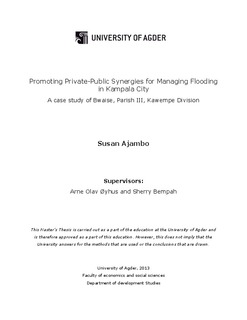Promoting private-public synergies for managing flooding in Kampala city : a case stydy of Bwaise, Parish III, Kampele division
Master thesis
Permanent lenke
http://hdl.handle.net/11250/135267Utgivelsesdato
2013Metadata
Vis full innførselSamlinger
Sammendrag
Many cities in the world, particularly those in Africa are faced with growing problems associated with flooding. Increased rain frequency and intensity alongside other factors such as settlement in flood plains, poor waste management, and increased surface run off exacerbate the situation. This study was undertaken to assess the possibility for effective collaborative management of floods in one of the cities in East Africa: Uganda. The focus was on effective reduction in vulnerability and risks from flooding through collaborative action. Local perceptions of why floods occur were explored and how communities adjust to them. Further, the possibility for collaborative action between the authorities and the flood prone communities was considered. In addition, the study attempted to establish a model with regard to how collaborative action should be organised. Qualitative methodologies were used in this study and they included; unstructured interviews, observations, focus group discussions and document review. Study findings revealed the diversity in perceptions with regard to the causes of flooding. The identified causes were categorised into those that were internal to the community and those that were induced. Community coping strategies were found to be effective only in the short run and a suggestion was made that a better approach should incorporate both the short term and the long term strategies. A further revelation pointed to the possibility for establishing collaborative flood management structures and was used as a basis to compile a model. However, it was acknowledged that though collaboration was possible it needed reconciliation of views and changes in attitude for it to be forged meaning fully. KCCA was considered, to be the best position to initiate such collaboration especially since it had the capacity and the resources to do so. It was thus concluded that synergy was possible and a model on how it can possibly be organised was presented.
Beskrivelse
Master thesis in development management - University of Agder 2013
